|
|
|
Sort Order |
|
|
|
Items / Page
|
|
|
|
|
|
|
| Srl | Item |
| 1 |
ID:
177755
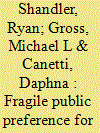

|
|
|
|
|
| Summary/Abstract |
To what extent does the public support the use of cyber weapons? We propose that public exposure to the destructive potential of cyber-attacks will dispel the clear cross-national preference for cyber strikes. To test this, we conducted two survey experiments (n = 2,585) that examine support for cyber versus conventional military strikes in the United States, United Kingdom, and Israel. In study 1, we exposed respondents to television news reports depicting various forms of terror attacks, and then measured the subsequent support for retaliatory options. Findings indicate that the high public support for deploying cyber weapons dissipated entirely among respondents exposed to lethal cyber-attacks. In study 2, we probed this vanishing support, finding that exposure to destructive cyber-attacks undercuts the perception of cyber as a less lethal domain, therefore diminishing its appeal. We conclude by discussing how the fragile public preference for cyber weapons encourages military escalation in the short-term.
|
|
|
|
|
|
|
|
|
|
|
|
|
|
|
|
| 2 |
ID:
177759
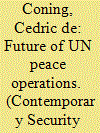

|
|
|
|
|
| Summary/Abstract |
This article considers the future of UN peace operations through a complexity theory lens. In the short-term peacekeeping will have to adapt to the consequences of the COVID-19 pandemic and the fall-out of the Trump presidency. In the medium-term peacekeeping will go through a phase of uncertainty and turbulence due to geopolitical power shifts in the global order. In the longer-term peacekeeping will have to adapt to a new multipolar global order characterized by coexistence, and a changing security landscape shaped by, among others, climate change, urbanization, and new technologies. Throughout these contraction, moderation, and adjustment phases, UN peacekeeping is likely to be guided by a principled adaptive approach, that allows it to adapt to the realities of the moment whilst staying true to its core form and identity. As a result, UN peacekeeping is likely to remain one of the most visible symbols of global governance and international cooperation.
|
|
|
|
|
|
|
|
|
|
|
|
|
|
|
|
| 3 |
ID:
177761
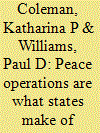

|
|
|
|
|
| Summary/Abstract |
Peace operations are a highly resilient international institution for managing armed conflict. Their resilience derives from what constructivists in International Relations theory call collective intentionality and the malleable constitutive rules that define and structure such missions. Despite a range of current constraints, challenges, and crises, peace operations are unlikely to become extinct unless a critical mass of states consistently withdraw material support for them and explicitly denigrate the concept of peace operations itself. We see little evidence that both these things are likely to occur. However, the constitutive rules guiding peace operations are likely to continue to evolve due to ideational and material changes. While the proliferation of actors and mission types makes precise predictions impossible, we expect an evolution both in how various actors define their own peace operations and how these actors relate to each other.
|
|
|
|
|
|
|
|
|
|
|
|
|
|
|
|
| 4 |
ID:
177756
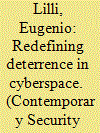

|
|
|
|
|
| Summary/Abstract |
This article explores the nature and the desirability of private sector contribution to national strategies of cyber deterrence. The article starts by developing a variation of the concept of cyber deterrence, called RCDC deterrence, which is simultaneously restrictive, comprehensive, dynamic, and complemental. Second, it applies RCDC deterrence to identify and analyze specific areas of cyber deterrence that can benefit the most from private sector contribution. Third, the article cautions about the potential security, legal, and moral issues that could arise from such private contributions. Instead of offering definitive answers on these complex issues, the article ends by suggesting avenues for further research. The ultimate objective is to assist decision-makers in designing policies and regulations aimed at maximizing the benefits of public–private cooperation in cyber deterrence while mitigating its potential downsides.
|
|
|
|
|
|
|
|
|
|
|
|
|
|
|
|
| 5 |
ID:
177757
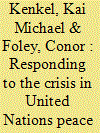

|
|
|
|
|
| Summary/Abstract |
This special forum discusses the future trajectory of UN peace operations at a time many stakeholders and analysts consider to be one of crisis, contestation, or at the very least transition. The UN is facing difficulties in responding effectively to many of the world’s worst recent conflicts, even where it has (or until recently had) operations. Even before COVID-19, the blue helmets were facing a period of serious retrenchment and budgetary constraints. Mission mandates have experienced a transformation, from the recent “robust turn” to the incorporation of stabilization mandates grounded in counterinsurgency/counterterrorism doctrine. The crossroads of economic downturn, geopolitical realignment and continuous adaptation of peacekeeping practice provides the backdrop of the contributions to the special forum that follows. The analyses presented here not only accompany the ongoing evolution of the nexus of issues that constitute peacekeeping studies but also reflect the breadth and depth of the extensive attendant academic literature.
|
|
|
|
|
|
|
|
|
|
|
|
|
|
|
|
| 6 |
ID:
177760


|
|
|
|
|
| Summary/Abstract |
This article highlights the domestic effects of the ongoing changes in United Nations peacekeeping practice on troop contributing states from the Global South. It juxtaposes scholarship on stabilization, the specific motivations of Global South troop contributing countries, and in particular the effects on civilian control of armed forces of peacekeeping participation. It argues that the “diversionary peace” hypothesis—which posits beneficial effects on civilian control for peacekeeping—has not obtained, and that current developments in United Nations peace operations will negatively affect civil–military relations in postcolonial sending countries. The text suggests avenues for future inquiry. One is the notion that stabilization may lead to a net negative effect on civilian control in unconsolidated democracies. This is due to stabilization's increased militarization, and its turn towards objectives that mimic the counterinsurgency mandates associated with military rule in the Global South, rather than a focus on the socioeconomic well-being of local populations.
|
|
|
|
|
|
|
|
|
|
|
|
|
|
|
|
| 7 |
ID:
177758
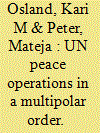

|
|
|
|
|
| Summary/Abstract |
UN peace operations need a new peacebuilding agenda that acknowledges both the transboundary nature of conflict drivers and the multipolar nature of the global order. This means casting aside the current stabilization approach, but also abandoning the pursuit of liberal peacebuilding of the unipolar era. Such a conflict transformation agenda would require UN peace operations to prioritize the rule of law and bottom-up approaches, thus creating the potential to be embraced by a much broader range of member states. In this article, we bring liberal peacebuilding critiques into a discussion with debates on the nature of the global order. Liberal peacebuilding critiques are rooted in the bottom-up problematization of international interventions and show what kind of peacebuilding is desirable. Conversely, the debates on the multipolar nature of the global order expose the top-down constraints as to what kind of peacebuilding is feasible.
|
|
|
|
|
|
|
|
|
|
|
|
|
|
|
|
|
|
|
|
|